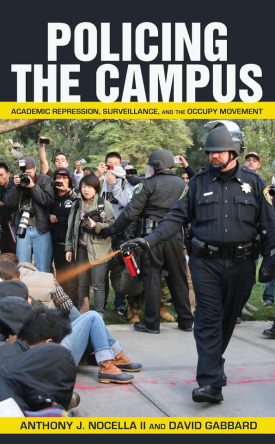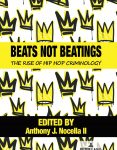Description
Policing the Campus: Academic Repression, Surveillance, and the Occupy Movement
Edited By: Anthony J. Nocella II and David Gabbard
__________
________________________________________________________________
Table of Contents
Dedication
Acknowledgements
Foreword: This Is Your Mind on Lockdown
Christian Parenti
Introduction: Canary in the Coal Mine
David Gabbard
PART I.
CAMPUS POLICE
1. Arrests and Repression as a Logic of Neoliberalism
Jason Del Gandio
2. Repression of Student Activism on College
Wesley Strong
3. Policing College Campuses: Race, Social Control, and the Securitizing of College Campuses
Daniel White Hodge
4. Policed Pedagogy: Controlling and Dominating Classrooms, Curriculum, and Courses
Kim Socha
5. Of Accountablity, Surveillance, and Fear: Speaking Out and Losing My Job
Barbara Madeloni
PART II.
THE SURVEILLED CAMPUS
6. Cameras and ID Card Swipes:
Privacy and the Cultivation of the Virtual Self
Richard Van Heertum
7. Socio-Technical Developments in Campus Securitization: Building and Resisting the Policing Apparatus
Ben Brucato and Luis A. Fernandez
8. We Are All Hokies: Surveillance Culture and Communication Technologies on a Post–Virginia Tech Campus
Caroline Kaltefleiter
9. Political Research: Scholarship as Terrorism
David Pellow and Scott DeMuth
10. The College Campus as Panopticon:
How Security and Surveillance Are Undermining Free Inquiry
Joe Lewis
PART III.
FROM DEFENDING PUBLIC EDUCATION TO THE OCCUPY MOVEMENT
11. Militant Privatization: The UC–Davis Pepper-Spray Incident
Sarah Augusto and Julie Setele
12. Higher Ed on a Slippery Slope: Pulling It Back from the Brink of Tyranny
Maura Stephens
13. Occupy Colleges: The Resurgence of U.S. Radical Student Activism
Ryan Thomson and Natalia Abrams
14. Faculty Should Join with Occupy Movement Protesters
on College Campuses
Henry Giroux
____________________________________________________________
WHAT PEOPLE ARE SAYING ABOUT THE BOOK:
Higher education is the next iteration of the war on terror. The rhetoric used by our government has become the next frontier of surveillance attempting to silence the academy. Gabbard and Nocella take us deep inside these mind fields and show us the new “big brother”at every turn. Yet, they end with a pedagogy of occupy the classroom and show how some universities are generating a climate of resistance.
— Dr. sj Miller, co-editor of “Change Matters: Critical Essays on Moving Social Justice Research from Theory to Policy”
Policing the Campus should enlighten, enrage, and empower us all to confront the militarization of higher education and transform our colleges and universities into what they are supposed to be: spaces of learning and liberation.
— Dr. David Naguib Pellow, Don Martindale Professor of Sociology, University of Minnesota and co-author (with Lisa Park) of “The Slums of Aspen: Immigrants vs. the Environment in America’s Eden”
Whether you agree or disagree with their conclusions, the essays in this volume are certain to inspire a much needed dialogue about the effects of police and military presences on college campuses. Everyone interested in the current state of higher education and its role in democratic society is sure to be equal parts intrigued and incensed by what they find within these pages.
— Dr. Steven W. Halady, Visiting Assistant Professor of Philosophy, Canisius College
We live in a time of unprecedented clampdown on student dissent and ‘policed pedagogy,’ super-surveillance at colleges across the planet. This book, concentrating on realities of repression largely in the U.S., will galvanize researchers elsewhere to investigate and struggle against similar forms of academic fascism engulfing campuses worldwide.
— Bill Templer, Independent Scholar, Bulgaria
As one who has had his classes infiltrated over the years by students from right wing organizations -— solely for the purpose of disrupting (and reporting on) my course content, I cannot say enough about the timeliness and importance of this excellent work. Academic freedom has been under attack for many decades and in many ways. Much ground has been lost that needs to be regained. Hopefully this book will contribute toward the accomplishment of that goal.
— Dr. John C. Alessio, Former SBS Dean, Minnesota State Mankato, author of “Social Problems and Inequality: Social Responsibility through Progressive Sociology”
Nocella and Gabbard have done it again! Policing the Campus minces no words and pulls no punches to focus the scholarly microscope on the repression and suppression of intellectual thought and action. Faculty and students alike will view their educational opportunities and work in a new light through this startling exposé of academic policing.
— Dr. Julie Andrzejewski, Professor, Department of Human Relations and Multicultural Education
In Policing the Campus, Gabbard and Nocella make a critical and radical intervention that challenges the policing and surveillance of higher education. If the influence of military, corporations, and law enforcement— and the creation of a police state on every campus— go unchecked, it will be impossible for democratic and free education to flourish.
— Sarat Colling, Institute for Critical Animal Studies
In the ever changing climate of higher education, the policies related to this system still reflect of a cultural climate that does little to recognize the diverse community in which higher education has become. The Book, Policing the Campus, push us to look at the climate of higher education and the response needed to move both our society and educational instruction to reflect and act in a more cultural responsive manner.
— Dr. Donald Easton-Brooks, Associated Dean of the School of Education, Hamline University and Editor of the Journal for Critical Urban Education
This book is a wake-up call for faculty to critically examine the extent to which corporations, conservatives, quasi-mental health professionals and the military have infiltrated higher education in a quest to suppress a liberal education-— our raison d’etre. Students and faculty are scrutinized for their behavior, and emergency response behavioral teams are kicked into action at the slightest indication of a mental health issue. “Deviance” is back in fashion, and we are all at risk from this new SWAT team.
— Dr. Janet Duncan, Associate Professor, Foundations and Social Advocacy, School of Education, SUNY Cortland
A must read for professors, students, staff, administrators, and the general public concerned about the future of education and democracy. Finally, here is a book that examines the police state that is growing on every campus.
— Dr. Priya Parmar, author of Knowledge Reigns Supreme: The Critical Pedagogy of Hip-Hop Artist KRS-ONE
Policing the Campus is a pointed collection that takes aim at the disciplinary logics and practices that increasingly dominate higher education. The essays that explore the relationships between campus activism and the Occupy movement are especially timely, but the entire book is a fruitful contribution to the debate over the freedom of the university in the 21st Century.
— Zack Furness, editor of Punkademics
Visited 22577 times , 11 Visits today




Comments are closed, but trackbacks and pingbacks are open.